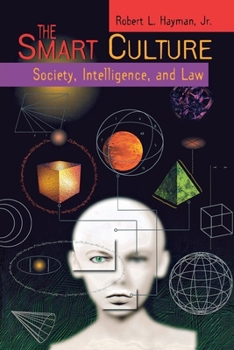The Smart Culture: Society, Intelligence, and Law
Select Format
Select Condition 
Book Overview
What exactly is intelligence? Is it social achievement? Professional success? Is it common sense? Or the number on an IQ test?
Interweaving engaging narratives with dramatic case studies, Robert L. Hayman, Jr., has written a history of intelligence that will forever change the way we think about who is smart and who is not. To give weight to his assertion that intelligence is not simply an inherent characteristic but rather one which reflects...
Format:Paperback
Language:English
ISBN:0814735347
ISBN13:9780814735343
Release Date:August 2000
Publisher:New York University Press
Length:414 Pages
Weight:1.45 lbs.
Dimensions:1.0" x 6.0" x 9.0"
Related Subjects
Behavioral Sciences Civil Rights & Liberties Cognitive Psychology Health, Fitness & Dieting Health, Fitness & Dieting History Law Legal History Philosophy Political Science Politics & Government Politics & Social Sciences Psychology & Counseling Social Science Social Sciences Specific TopicsCustomer Reviews
3 ratings
A great integrative work.
Published by Thriftbooks.com User , 22 years ago
I'm impressed with Hayman's ease in presenting challenging material in an integrated framework that is made remarkably easy to understand. This is an important work that challenges various assumptions you never realized you had, but that now you can't deny having made, and made without real justification. It is by provoking that kind of analysis that Hayman's work has the potential to make us all "smarter." It's rare to find a book that conveys such moral passion for a truly egalitarian society, yet argues for that society using such carefully constructed rational arguments, often citing emprirical and historical resources, while also tapping into the author's personal experiences. Highly recommended.
A penetrating, provocative, and probing look at intelligence
Published by Thriftbooks.com User , 23 years ago
Professor Hayman looks at an issue in our society that is rampant with misunderstanding and rife with malaise, the basing of intelligence among our myriad cultures. His work engages the reader with common sense and personal experience as well as superb research. I can only recommend this text in the highest of glowing terms, an essential read for any individual seeking to uncover one critical reason why our society is unjust and in need of balancing.
THE MYTHS OF MERIT AND EQUALITY UNDER LAW
Published by Thriftbooks.com User , 26 years ago
Nancy Levit * In 1993 the Educational Testing Service renamed the Scholastic Aptitude Test. Amid controversy that the test contained racial and cultural biases, did not measure intelligence, and thus was inappropriately called an "aptitude" test, test officials changed the name of the SAT to the Scholastic Assessment Test. In 1997, the testing service again renamed its college entrance examination: the SAT became simply the SAT - initials only, no acronym, no squabbles over the meaning of aptitude, achievement, or intelligence. The same thing happens in workplaces all over the country. Employers pronounce that they make hiring decisions based on "merit" - and everyone nods. In The Smart Culture: Society, Intelligence, and Law, law professor Robert L. Hayman, Jr., explodes the myths that everyone has come to accept about "intelligence," "merit," and "race." He then shows the ways in which law has been complicit ! in keeping these myths unexamined. Hayman's thesis is simple and straightforward. We have bought into the very idea that there is a meritocracy, and that the meritocracy reflects a natural order. We assume that people succeed based on "merit." In actuality, those people who succeed - for reasons of race, property-ownership, and power - have been the ones who get to define "merit." Merit, as Hayman points out, is largely a definitional tautology: we identify certain characteristics we deem worthy (such as test-taking ability), and then call people who can perform those tasks laudatory labels ("smart"). We thus reward people who are worthy, based, of course, on the possession of the previously identified characteristics. Merit is not natural, Hayman says, "It is the carefully crafted product of centuries of cultural propaganda, a myth of natural inequality perpetuated by men in power - by a political, economic, and intellectual elite. & qu! ot; Hayman makes the all-important link between race, me! rit, and intelligence. While our nation formally commits to equality under law, our culture still possesses deeply held beliefs about the natural inequalities of its citizens. From the time of its founding documents, our country promised equality. But declaring all men equal was not only a promise unfulfilled, it was a promise founded on a contradiction: the principle did not apply to women, slaves, and those without property. "A nation committed now to equality," Hayman writes, "remained fundamentally convinced that its people were, by nature, unequal." This idea of natural differences between the races was promoted not only by Southern congressmen in the Reconstruction debates, but by the Western European "race scientists" of the late eighteenth and early nineteenth centuries, the American eugenicists of the early 1900s, and the Aryan supremacists in 1930s Germany. It is a debate that has been resurrected in late twentieth century Americ! a by The Bell Curve. The Smart Culture is a political history of the concept of intelligence. H





